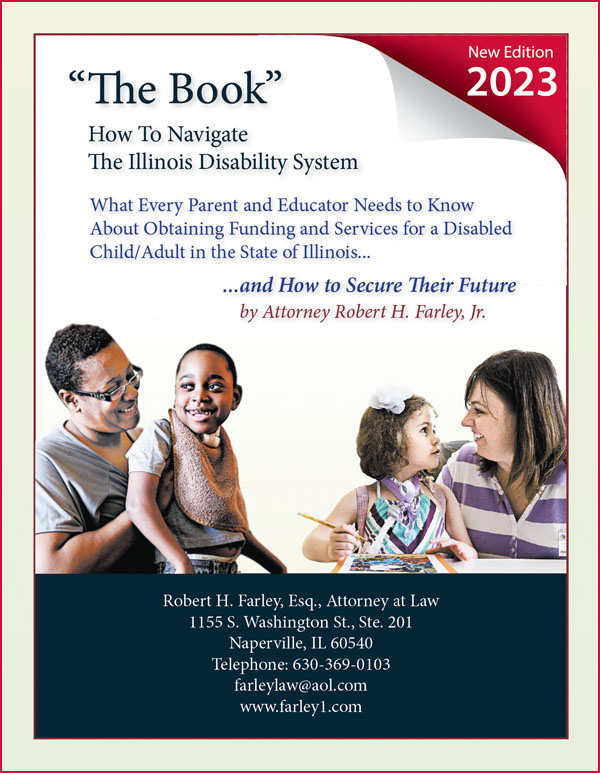Legal Specialties for Children and Adults with Disabilities and Their Families
Click on any of the substantive legal specialties below to learn more.
To-Do List for Parents and Guardians of Children with Disabilities
1. Download and read The Book - "How to Navigate the Illinois Disability System" by Attorney Robert H. Farley, Jr. (Book updated 2019)
2. If the child is under the age of 21 and is Medicaid eligible and has a mental health or behavioral disorder, then he or she may be entitled to immediate funding without having to be on a waiting list. This applies for children who have either a developmental disability or a mental health condition. Read more in The Book.
3. Persons who are developmentally disabled, mentally ill, physically disabled or medically fragile are entitled to funding and services. Read more in The Book.
4. Evaluate and Understand Your Child's Assets: Your child should not have more than $2,000 in their name, including any custodial accounts or bonds held by you.
All programs for children and adults with disabilities in Illinois are Medicaid-funded; and, if your child has more than $2,000 in assets or inherits money directly, then he or she may have to spend down those funds to pay for services, unless these funds are placed in the proper Special Needs Trust.
5. Establish a Special Needs Trust - Your child with a disability will be the beneficiary of this trust. Funds in the trust can exceed $2,000 and Social Security, Medicaid, and the State of Illinois will NOT count the funds as your child's assets. An inheritance or life insurance or retirement fund benefits would NOT be given directly to your child but to the Special Needs Trust instead.
Click here to learn more about Special Needs Trusts.
6. On Your Child's 18th Birthday, Apply for SSI (Supplemental Security Income). Your child may be eligible for approximately $771 per month. Your child's benefit will be reduced by one-third if you do not charge your child for food and shelter costs. Consider a Special Needs Trust for the child's assets as your child will be not eligible for SSI if he or she has more than $2,000 in his or her own name.
Click here for more information on SSI.
7. On or Before Your Child's 18th Birthday, consider Guardianship for your child. Does your child need assistance making decisions affecting their health, personal welfare, and financial matters?
Click here to learn more about guardianship.
8. Know and Understand Yours and Your Child's Rights to Special Education Services. Your child is entitled to a "free appropriate public education" in the least restrictive setting that provides special education and related services designed to meet their unique needs.
Click here to learn more about special education services for children with disabilities.
 Read Mr. Farley's bio
Read Mr. Farley's bio
